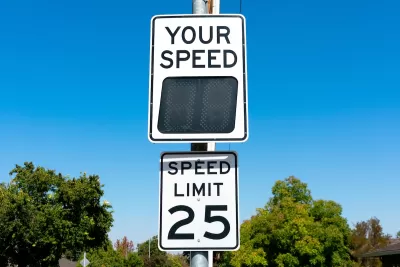More than half of drivers would be comfortable with speed-limiting technology or audio and visual signals warning them they’ve gone over the speed limit.

A new survey from the Insurance Institute for Highway Safety (IIHS) shows that over 60 percent of the more than 1,800 drivers surveyed wouldn’t mind if their cars provided ‘audible and visual’ warning signals when they exceed the speed limit.
According to a piece in GovTech by Dave Werner, “about half of drivers say they wouldn’t mind technology that makes the accelerator pedal harder to press or automatically restricts speed.”
The survey reveals a surprising level of comfort with speed governing technologies, also known as Intelligent Speed Assistance (ISA), hinting that their adoption may not be as difficult in the United States as some have hypothesized. This matters because “Any version of ISA likely to be adopted in the U.S. would give drivers the option to switch it off, so it will only be beneficial to the extent that the public finds it acceptable.” The European Union is already requiring the technology as of this July.
As Werner explains, “More robust ISA systems sound a warning or flash an alert when the driver exceeds the limit — or when they exceed it by more than a specific amount. Others provide accelerator feedback — making the pedal harder to push — or restrict power to the engine to prevent the driver from going too fast.”
An even higher number of respondents said they would like to see the speed limit prominently displayed (80 percent), while 70 percent wanted an unobtrusive tone to notify them of speed limit changes, signaling a preference for ‘advisory systems’ over those that physically intervene.
FULL STORY: Study: Most Drivers OK With Anti-Speeding Technology

Planetizen Federal Action Tracker
A weekly monitor of how Trump’s orders and actions are impacting planners and planning in America.

Restaurant Patios Were a Pandemic Win — Why Were They so Hard to Keep?
Social distancing requirements and changes in travel patterns prompted cities to pilot new uses for street and sidewalk space. Then it got complicated.

Map: Where Senate Republicans Want to Sell Your Public Lands
For public land advocates, the Senate Republicans’ proposal to sell millions of acres of public land in the West is “the biggest fight of their careers.”

Maui's Vacation Rental Debate Turns Ugly
Verbal attacks, misinformation campaigns and fistfights plague a high-stakes debate to convert thousands of vacation rentals into long-term housing.

San Francisco Suspends Traffic Calming Amidst Record Deaths
Citing “a challenging fiscal landscape,” the city will cease the program on the heels of 42 traffic deaths, including 24 pedestrians.

California Homeless Arrests, Citations Spike After Ruling
An investigation reveals that anti-homeless actions increased up to 500% after Grants Pass v. Johnson — even in cities claiming no policy change.
Urban Design for Planners 1: Software Tools
This six-course series explores essential urban design concepts using open source software and equips planners with the tools they need to participate fully in the urban design process.
Planning for Universal Design
Learn the tools for implementing Universal Design in planning regulations.
Heyer Gruel & Associates PA
JM Goldson LLC
Custer County Colorado
City of Camden Redevelopment Agency
City of Astoria
Transportation Research & Education Center (TREC) at Portland State University
Camden Redevelopment Agency
City of Claremont
Municipality of Princeton (NJ)





























